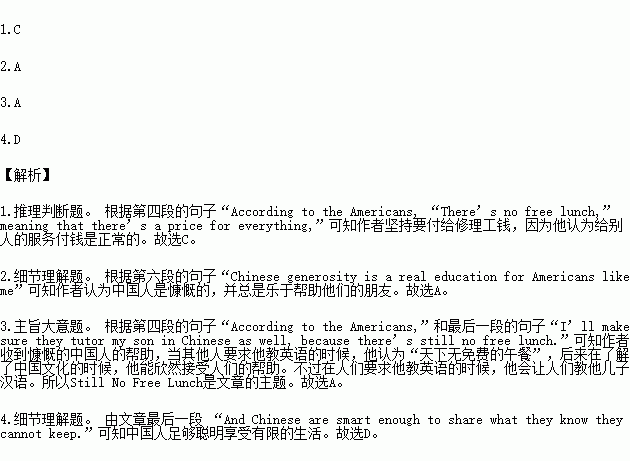题目内容
When I paid for the bicycle repair, the repairman told me, “ No change, Professor Pan. We’re friends.”
“I’d rather pay,” I replied. “If it’s free, I can’t afford it.”
Chinese often refuse payment for professional services, insisting, “We’re friends now!” But then they show up later to ask me to tutor them in English, or get them into an American university, and I wish I’d have just paid the 30 yuan I owed them in the first place.
According to the Americans, “There’s no free lunch,” meaning that there’s a price for everything, and I’m always looking around to figure out what this means.
Many of our neighbors have given us fruit or flowers or costly teas, never asking anything in return. For years, a bicycle repairman has repeatedly refused to let me pay him. “Wait until you have something major to fix!” he insists.
Chinese generosity is a real education for Americans like me, who would rather avoid social entanglements (纠纷) and just hand over the money. But cash can’t make up for the greatest gift – friendship.
When an American saw some of my friends sitting on bamboo stools under the trees, sipping tea, he said, “They must have nothing better to do.” “Actually,” I said, “they are professors, with plenty to do. But probably you’re right in saying that, at this moment, they have nothing better to do. And neither do I.”
And I joined the group. We chatted about tea and Chinese cooking and how much my boys have grown since we arrived. One man said, “They were pocket-sized when you came here. Now they’re taller than you. How time flies.”
How life flies. And Chinese are smart enough to share what they know they cannot keep. They freely give of their time, never too busy to help a friend. And they are teaching me, slowly, to both give and receive. So the next time someone says, “No charge. We’re friends.” I will thank them heartily. But if they show up later asking me to tutor them in English, I’ll make sure they tutor my son in Chinese as well, because there’s still no free lunch.
1.Why did the author insist on paying the repairman while he was offered free repairs?
A. Because he was an upright man.
B. Because he didn’t know the repairman.
C. Because he thought it natural to pay for other’s service.
D. Because he didn’t want to help others in return.
2.Generally, the author thinks that ___________ .
A. Chinese are generous and always ready to help their friends
B. Chinese are good at exchange of equal values
C. Chinese are free enough to drink and chat with their friends
D. Chinese are helpful but don’t treasure time
3.The best title for the passage should be “_________ ”.
A. Still No Free Lunch B. A Good Lesson from Chinese
C. True Help or Not D. Learn to Both Give and Receive
4.Which of the following is TRUE?
A. All the Chinese help foreigners on purpose.
B. Chinese like to ask for help.
C. The author thinks little of the Chinese way of life.
D. The author thinks that Chinese are wise enough to enjoy the limited life.
 阅读快车系列答案
阅读快车系列答案
